Table of Contents
As the body ages, processing certain vitamins — especially B12 — becomes a real challenge. What once came naturally now requires a bit more attention. One such essential vitamin is vitamin B12. It is mainly stored in the liver, and its functions include being involved in neurologic functioning and the formation of red blood cells, all of which are vital for long-term health. A blood test can diagnose B12 deficiency.
Testing is especially crucial for the old ones, as ageing impairs the ability of the body to absorb vitamin B12 normally. If you test just lower in B12, do not worry — the deficiency is one of the most common in the world. For an old person, it is a very natural deficiency, and there are numerous methods to go about its treatment.
According to the National Institutes of Health (NIH), around 6% of U.S. adults under 60 are deficient in vitamin B12, but that nearly doubles to about 20% after the age of 60.
Women are exposed to risk as a result of their menstruation, hormonal changes, nutritional needs during pregnancy, and food choices, especially for those following vegetarian or vegan diets. Nevertheless, many commonly used drugs also prevent females from absorbing B12, so another risk factor for women is interfering with B12 absorption; drugs against acid reflux and a drug called metformin used for diabetes are examples of such drugs.
One of the riskiest parts? B12 deficiency symptoms can take months — even years — to fully show up, and by then, cognitive or neurological damage may already be permanent. Poor concentration, fatigue, mood disturbances, and numbness are just a few to list.
This article breaks down why vitamin B12 matters, how to spot a deficiency, and what to do about it.
What Is Vitamin B12?
Also cobalamin, vitamin B12 is necessary for the body for the formation of RBCs, for brain functions, and DNA synthesis. Since the body cannot produce B12 on its own, it must be supplied_into the body-from animal-based foods-meats, dairy, eggs-or supplements. It is advantaging the vitamin to be water-soluble, so that any extra should just go down the pipes in urine. Awesome, isn’t it?
Disguising the deficiency of the vitamin for years is possible; however, when symptoms appear, they are vague and can be mistakenly associated with depression, menopause, thyroid conditions, or chronic fatigue syndrome. It has been observed that many women remain untreated until more severe complications arise.
Also Read: Heart Attack Symptoms in Women Over 50: What Every Woman Should Know
Benefits of B12
Our body needs vitamin B12 for the development of the central nervous system, that is, the brain and spinal cord. It also helps keep the nails, hair, and skin healthy.
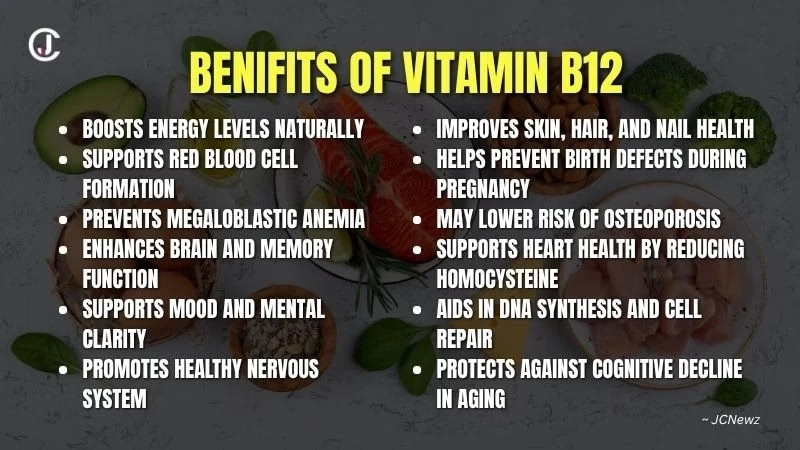
Bone and red blood cell health
Vitamin B12 is required in the body for producing healthy red blood cells, white blood cells, and platelets. Around 1% of the very old red blood cells are destroyed daily and replaced. Red blood cell formation and development require Vitamin B12 and Vitamin B9 (folate). Without either of these vitamins, DNA production becomes complicated, and the immature red blood cells eventually perish. This results in anemia.
B vitamins, including B12, have been linked by numerous studies to a decrease in the chances of osteoporosis (a disorder that weakens your bones) and hip fractures. Yet no evidence has suggested that B supplements would act in preventing these bone diseases.
Vitamin B12 for vision
Optic neuropathy, a rare condition, occurs from a lack of Vitamin B12. This can cause a gradual loss of vision and result in blind spots. It happens when the optic nerve, the nerve that transmits visual information from the eye to the brain, is damaged.
Improved mood and memory
Studies have linked depression and low levels of B12, yet there is no evidence that increasing B12 levels can lessen symptoms of depression. But, screening individuals for B12 deficiency prior to admitting them to B12 supplements may be worth trying to delay or prevent depression. More research needs to be done in the direction of proving this.
B12 deficiency affects cognitive functions (thinking, judgment, and learning) and memory. Thus, it may be involved in Alzheimer’s disease and stroke. One study showed that B12 treatment of persons with mild cognitive impairment and low B12 status was able to provide some relief from cognitive symptoms in most of the cases.
Also Read: Sleep & Weight Loss: Why Poor Sleep is Making You Gain Weight
Better energy levels
One study shows that if you feel tired on most days and your levels of B12 remain low, raising those levels to a normal count might just give you that energy boost. However, these supplements tend not to work on people who already have adequate levels of B12.
Vitamin B12 for hair, skin, and nails
Some of the lesser B12-induced problems include hyperpigmentation, vitiligo (light patches on the skin), eczema, mouth ulcers, and acne. On the contrary, a high amount of B12 in your system can also cause vitiligo, mouth ulcers, eczema, and acne. This vitamin deficiency is also associated with hair loss, although strong evidence proving that B12 supplements can reverse it has yet to come forward. Low B12 can sometimes cause brown-grey or bluish nails, but at least, you can reverse the effect once your vitamin B12 is back to normal.
What Does Having a Vitamin B12 Deficiency Feel Like And What Are the Consequences?
Vitamin B12 deficiency symptoms can sometimes look or feel just like the signs of normal aging. It can mimic or aggravate:
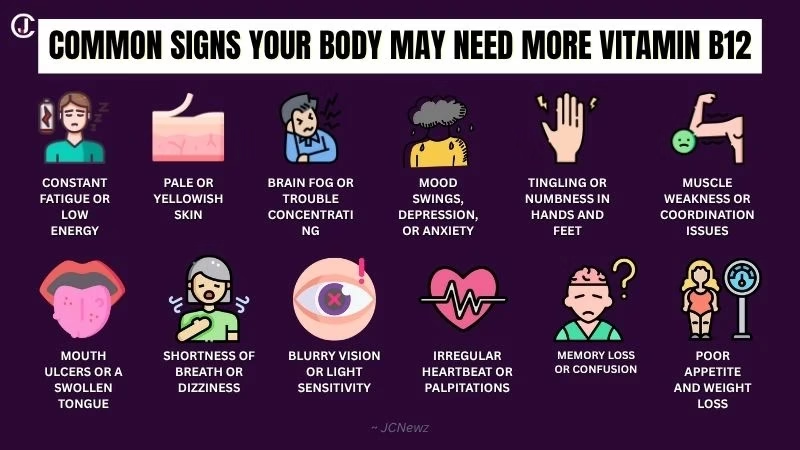
- Alzheimer’s
- Multiple sclerosis and other neurological disorders
- Psychiatric disorders such as depression, anxiety, or bipolar disorder
- Cardiovascular disease
- Autoimmune disorder
- Cancer
Sometimes, though, B12 deficiencies don’t typically look that bad and might, therefore, go undiagnosed. Usually, you see memory loss, an onset in cognitive decline, brain fog, decrease in mobility, and sore all over body. Some physical symptoms of vitamin B12 deficiency include:
- Tingling or numbness in the hands, legs, or feet
- Difficulty in walking
- Anemia
- Swollen or inflamed tongue
- Yellowish skin
- Paranoia or hallucinations
- Fatigue
Among the long-term developments of B12 deficiency, which still tend to rise in an old-age scenario, are poor formation of red blood cells, low-level metabolism, neuropathy in execution, and weak bones. Anything else left prone to B12 deficiency might be a neurological downturn into Alzheimer’s or dementia.
Who is at Risk for Low Vitamin B12 Levels?
Because this vitamin is mainly found in animal products, vegans or vegetarians stand a chance of being B12 deficient.
If one eats enough vitamin B12 but somehow suffers from the presence of an illness, deficiency can occur. Vitamin B12 absorption usually means a complicated multi-step process, so any interruption at any point in the chain can cause interference and prevent absorption or normal function thereof.
Vitamin B12 Absorption Process:
- In the mouth, a protein in saliva (haptocorrin) binds with the B12 in whatever food has been ingested.
- In the stomach, acid and enzymes release B12 from the food eaten allowing it to bind to an intrinsic factor.
- At the ileum (the distal small intestine), B12 is absorbed into the body.
Factors Associated with Vitamin B12 Deficiency:
You are prone to a deficiency if you:
- Are into vegetarianism or veganism
- Are over the age of 50 (for some reason, your stomach stops secreting sufficient acid to absorb B12).
- Suffer from pernicious anaemia or digestive problems like Crohn’s or celiac disease
- Have had stomach surgery (ex: gastric bypass)
- Take drugs such as metformin or acid blockers
Did You Know: Contrary to vitamin B12-rich foods, B12 in supplements or fortified foods (some cereals, for instance, or plant-based milks) does not have to enter all these processes; it is already in a form that can easily be absorbed by the body. So, these options might help people who have trouble absorbing B12 from their foods.
Also Read: Bloating Solutions: 7 Effective Science-Backed Tips to Try
Sources of Vitamin B12
You can get vitamin B12 from animal products, which have it naturally, or from foods that have been fortified with it. These include:
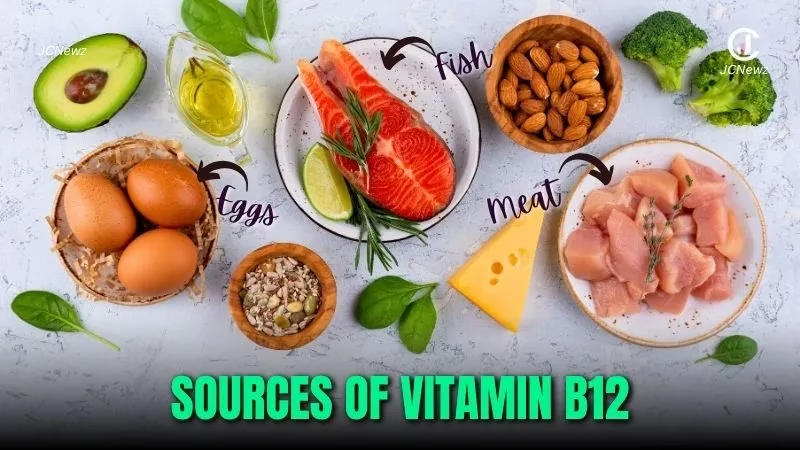
Animal-Based Sources of Vitamin B12
- Meat
- Beef liver (extremely high in B12)
- Ham
- Chicken breast
- Fish & Seafood
- Salmon
- Rainbow trout
- Haddock
- Cooked clams (very high B12 content)
- Poultry
- Chicken breast
- Turkey (not mentioned but also a great source)
- Eggs
- Whole eggs (especially yolks)
- Dairy Products
- Milk
- Yogurt
- Cheese
Vegan-Friendly Sources of Vitamin B12
Since natural plant-based sources of vitamin B12 are virtually nonexistent, fortified foods and supplements are essential for vegans. Here’s what to include in a B12-rich vegan diet:
✅ Fortified Foods
- Fortified breakfast cereals
(Check labels—brands like Grape-Nuts, Total, or bran flakes often include B12) - Fortified plant-based milks
- Soy milk
- Almond milk
- Oat milk
- Rice milk
(Always check the ingredients for added B12)
- Fortified nutritional yeast
(Tastes cheesy and works great on pasta, popcorn, or veggies) - Fortified meat substitutes
(e.g., vegan sausages, burgers, or nuggets like Beyond Meat or Quorn) - Fortified tofu or tempeh
(Only some brands—read labels carefully) - Fortified breads and grain products
- Fortified vegan spreads
(Certain margarines or plant butters contain added B12)
⚠️ Important Note
- Natural foods like spirulina, mushrooms, seaweed, or the fermented ones do not contain any reliable, bioactive B12. They may have some B12 analogs that simply would not work in a human being.
- Recommended intakes: 2.4 mcg/ day minimum for an adult. Most of the vegans are on 25 to 100 mcg daily, or 1,000 mcg weekly, for keeping their levels optimal.
Foods and Drinks to Avoid (or Limit) If You Have Low Vitamin B12
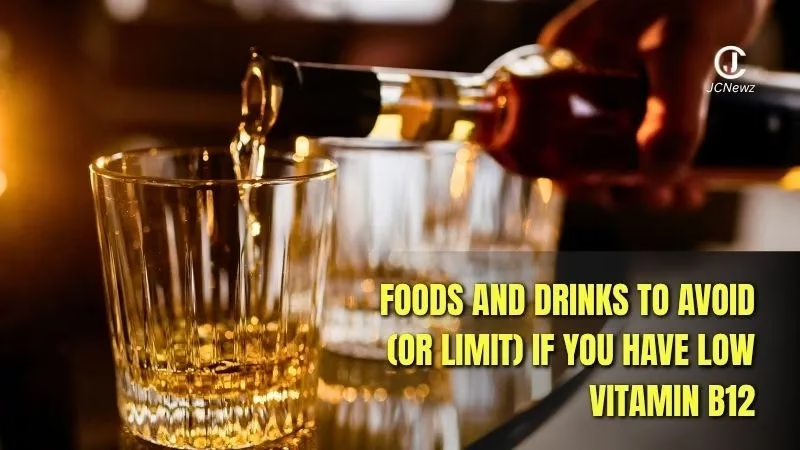
1. Alcohol
- Why: Alcohol in an irritant to the stomach mucosa, bringing about the suppression of intrinsic factor, a required protein in B12 absorption.
- Moreover: The liver damage sustained due to alcohol intake impairs nutrient storage and processing.
2. Caffeine (Coffee, Tea, Energy Drinks)
- Why: High doses of caffeine prevent nutrient absorption and promote the urinary excretion of B vitamins.
- Tip: One or two cups per day should be fine, and very high intake should be avoided, especially around B12-containing meals.
3. Refined Carbohydrates and Processed Foods
- White bread, pastries, packaged snacks, sugary cereals
- Why: These foods do exactly the opposite: uneducated about nutrients and taking away the time of potential customers for foods finer in basic or fortified B12.
4. Sugary Drinks (Sodas, Sweetened Teas, Sports Drinks)
- Why: Too much sugar puts the digestive system and liver under stress and that can indirectly interfere with nutrient absorption.
5. Undercooked or Raw Meat
- Why: It can harbor bacteria (such as tapeworms or H. pylori) that wear out the stomach lining and interfere with the absorption of B12.
6. High-Sodium Processed Meats
- Deli meat, sausages, and hot dogs.
- Why: They may hold onto a good dose of B12, but their salts along with preservatives could harm gut health by raising inflammations.
7. Artificial sweeteners (in excess)
- Why: Some research suggests that they interfere with gut bacteria-important for processing and absorbing nutrients.
Other Things That Could Interfere with the Absorption of B12 Include:
- Smoking: The toxins in cigarette smoke do destroy the lining of the stomach, thereby inhibiting absorption.
- Antacids/PPIs (like omeprazole): As all of these work by reducing acid in the stomach, they reduce acid levels that dissociate B12 from the food.
- Metformin: Used for treatment of diabetes, it ends up depleting B12 levels if taken for a long time.
- Certain Antibiotics: May destroy the gut flora, which are involved symbiotically with B12 metabolism.
What to do Instead
- Whole foods that promote the nutrients needed for B12.
- Plenty of water, no excess sugar, caffeine, and alcohol.
- When taking B12 supplements, keep them away from breakfast-brewed coffee and teas formed for good absorption.
Recommended Daily Intake of Vitamin B12 (RDA)
(According to age, pregnancy, and breastfeeding status)
| Age Group | Recommended Intake (mcg/day) |
| 0–6 months | 0.4 mcg |
| 7–12 months | 0.5 mcg |
| 1–3 years | 0.9 mcg |
| 4–8 years | 1.2 mcg |
| 9–13 years | 1.8 mcg |
| 14 years and older | 2.4 mcg |
| During pregnancy | 2.6 mcg |
| While breastfeeding | 2.8 mcg |
📝 Notes:
- “mcg” stands for micrograms
- There can be higher needs for those who have absorption problems, follow a vegetarian/vegan diet, or suffer from a particular medical condition.
- Never start supplementation without first consulting your physician. This is especially if you are pregnant or breastfeeding.
Vitamin B12 Supplements: Who Needs Them and Why
For those whose ability to absorb nutrients from food sources is hampered for one reason or another, vitamin B12 supplementation offers a simple method of supply. They are presented as injections, nasal sprays, sublingual drops, tablets, and capsules. Since dietary B12 in plant-based meals is not in active form, vegans and vegetarians usually have to supplement their diet with B12.
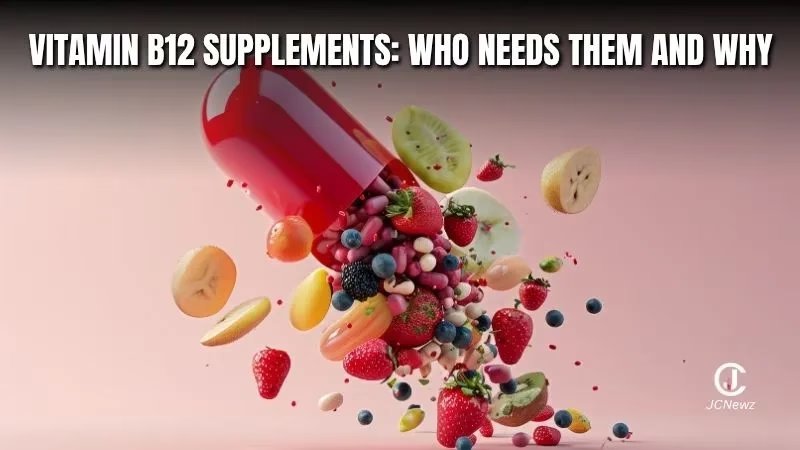
Other potential beneficiaries include those advanced in years; those with digestive issues like celiac or Crohn’s; and those taking particular medications such metformin (used for diabetes) or proton pump inhibitors (used for acid reflux) as B12 is vital for the development of the fetus and subsequently of the baby; vegans or plant-based diet-friendly pregnant or nursing women.
Whether supplementing is being thought about to treat a deficiency or to preserve wellness, B12 supplements should be great guards of energy, mood, memory, and general health. For the sort and dose most appropriate for your needs, always ask your doctor.
Vitamin B12 and Pregnancy
Are you pregnant? Or are you following a vegan or vegetarian diet? Or do you plan to nurse your child? Then it is a fact that you must triple-check with your doctor to ensure that you get enough vitamin B12 to keep your child healthy. A deficiency of vitamin B12 causes the child to suffer delays in development or a condition called failure to thrive. It is an important nutrient for the brain and spinal development.
Final Thoughts
Vitamin B12 is an essential vitamin that, if deficient, can usher in complications and diseases. It is usually said that if a person maintains a well-balanced diet and is perfectly healthy, he should get an adequate amount of this vitamin from the foods he eats.
Risk factors predispose vitamin B12 deficiency into older persons or those taking drugs, having some gastrointestinal disturbances, and most importantly, anyone following a vegan and a plant-based diet. These people might want to consider the choice of taking supplements or have a discussion with a physician concerning vitamin B12 injections.
The Research so far has proven that seaweed or any other foods being offered to vegans or plant-based eaters as real sources of vitamin B12 are false, hence what the plant-based individuals should rely on are foods fortified with the vitamin or supplements.
A person should seek a doctor to consult when any questions arise about nutritional supplements.
Sources
Medical News Today. Vitamin B12 Foods, Benefits, and Vegan Sources.
https://www.medicalnewstoday.com/articles/vitamin-b12-foods
PharmEasy. Top Vitamin B12 Foods to Include in Your Diet Today.
https://pharmeasy.in/blog/top-vitamin-b12-foods-to-include-in-your-diet-today/
Harvard Health. The A-list for Vitamin B12 Sources.
https://www.health.harvard.edu/staying-healthy/the-a-list-for-vitamin-b-12-sources
NIH Office of Dietary Supplements. Vitamin B12 – Fact Sheet for Health Professionals.
https://ods.od.nih.gov/factsheets/VitaminB12-HealthProfessional/
WebMD. Vitamin B12 Deficiency: Symptoms, Causes, and Treatment.
https://www.webmd.com/diet/vitamin-b12-deficiency-symptoms-causes
WebMD. Vitamin B12 Dosage for Older Adults: What to Know.
https://www.webmd.com/healthy-aging/what-to-know-about-vitamin-b12-dosage-for-older-adults
Healthline. Do B12 Vitamins Help With Energy?
https://www.healthline.com/health/b12-vitamins-for-energy


4 thoughts on “Vitamin B12 Foods After 50: 12 Essential Sources You Need”